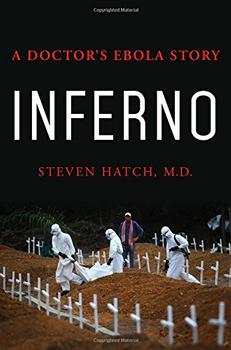Summary | Excerpt | Reviews | Beyond the Book | Readalikes | Genres & Themes | Author Bio

A Doctor's Ebola Story
by Steven Hatch
In short, it was an ideal place for a killer virus that moved at a Goldilocks pace—not too fast for people to recognize immediately that something was dangerously amiss, and not too slow for it to easily hitch a ride on its human host to make more copies of itself, but just the right speed to stay out of reach of local, regional, and eventually, world health authorities.
Touch was how the virus spread. Any direct, skin-to-skin contact with an infected person, or the virus-filled fluids that issued from them, provided a chance for spread. Fortuitously for the virus, West Africans, whether Christian or Muslim, observe a funereal custom by which acquaintances pay their respects to the dead by touching the body directly and handling it as part of the burial rites. To decline to perform this action—something that public health authorities would soon advise—was tantamount to refusing to shake someone's hand in the West for no apparent reason. It would have been regarded as obnoxious in the extreme, an affront to traditional values. The more funerals that took place, the farther the virus would spread.
The recognition that this was an Ebola epidemic would not come until nearly the end of March 2014. At that time, blood samples had been taken by staff members of Médecins Sans Frontières, or MSF, the group known better to Americans as Doctors Without Borders, and were sent to Europe for testing. MSF had an inkling that something wasn't right in the weeks before, and eventually the blood samples proved it. The WHO was informed and sounded the alarm.
But other events were taking place in the world that had stretched the WHO thin. At the time, a virus known as MERS-CoV—the Middle Eastern Respiratory Syndrome Coronavirus—had generated a fair amount of alarm and was occupying the efforts of WHO officials day and night. And that was only the beginning. Dr. Robert Fowler, a physician working with the WHO at the time, said that the discovery of an Ebola outbreak in West Africa with everything else happening at that time was like "a plane crashes in the Hudson in the morning, and there's a snowstorm in the afternoon and floods in the subways in the evening, and then you have two planes hit the World Trade Center in the middle of the night." Moreover, the cash-strapped WHO was tasked with responding to the outbreak with a regional staff whose budget had been cut in half over the span of several years. To expand Fowler's analogy, it was as if the calamities befalling New York were met with a response from a police and fire department working something very close to a skeleton crew.
To make matters worse, politics got in the way. Ebola experts from the CDC and WHO's headquarters in Geneva were initially stiff-armed by local African WHO officials, who wanted to "prove they could handle this one without help." As guiding principles, self-sufficiency and self-reliance were the recipe for Africa's future success. In an Ebola outbreak, however, that strategy backfired, and although no media reports can explain exactly how much of a delay these back-channel arguments caused, precious time may well have been lost in the early days.
Then came what almost any impartial observer would regard as a moment of pure farce, perhaps the most darkly comic moment of the entire epidemic: A Twitter war broke out between public health organizations, as if one group had just dissed the other's wardrobe. The WHO administrators appeared to regard the outbreak relatively lightly. "There has never been an #Ebola outbreak larger than a couple hundred cases," wrote WHO spokesperson Gregory Härtl in the days following the announcement of the outbreak, later saying Ebola "has always remained a very localised event." By this time, about fifty cases had been documented, in keeping with the size of many of the outbreaks that occurred during the 2000s.
But MSF, whose ground intel was reporting a different story, reacted with incredulity, noting in a press release that "we are facing an epidemic of a magnitude never before seen in terms of the distribution of cases in the country."
Excerpted from Inferno by Steven Hatch. Copyright © 2017 by Steven Hatch. Excerpted by permission of St. Martin's Press. All rights reserved. No part of this excerpt may be reproduced or reprinted without permission in writing from the publisher.
Your guide toexceptional books
BookBrowse seeks out and recommends the best in contemporary fiction and nonfiction—books that not only engage and entertain but also deepen our understanding of ourselves and the world around us.